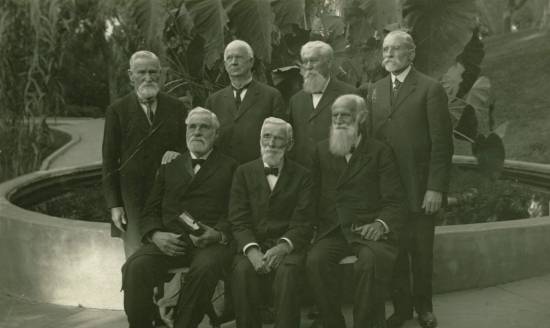Adventists believe we are saved by faith, which is the belief and trust we have in Jesus Christ to save us from our sins. Jesus, then, enables us to live in harmony with God’s commandments and serve others with love—sometimes referred to as “works.”
How does this understanding match up with what the Bible has to say about the relationship between faith and works?
Join us as we investigate:
- What the Bible says about faith and works
- How Adventists interpret and live out these teachings
- How understanding this subject has shaped Adventist history
We’ve covered faith and works in depth in another article, so let’s take just a moment to review that.
What does the Bible say about faith and works?
The Bible tells us that we are saved by faith, not by works:
“For by grace you have been saved through faith, and that not of yourselves; it is the gift of God, not of works, lest anyone should boast” (Ephesians 2:8 –9, NKJV).
Because eternal life is a gift, it can’t be earned by any effort of ours (Romans 11:6; Titus 3:5). According to Isaiah 64:6, even our best efforts to do good are like filthy rags—they lead us to become focused on ourselves and what we can do rather than the greater things God wants to do for us.
As Ephesians 2 mentions above, if we could be saved by our own works, we might become proud of our efforts; and some would have an advantage over others when it comes to salvation.
So, do our works matter then?
Well, good works—rather than earning our salvation—are a product of our salvation. When we choose to follow Jesus, He places His Spirit in us, helping us become more like Him in the way we act. We receive His goodness and love and reveal those qualities to others.
Thus, all the goodness in our lives is simply a result of Jesus shining out through us.
The teachings of Jesus and the early church leaders make this clear—both faith and works are an integral part of the Christian journey:
Jesus taught that true faith will produce good works (John 15:1–8)
Jesus compared Himself to a vine and His followers to branches on the vine. Only branches that are connected to the vine can produce fruit.
Think of it like a lamp plugged into the wall. Without being plugged in—connected to the source of power—it won’t produce any light.
Similarly, only by being connected to Jesus—our power source—will we be able to live out the good works He created us for (Ephesians 2:10).
Paul taught that faith is all you need to be saved (Ephesians 2:8–9)
The writings of the apostle Paul emphasize the importance of faith as the only means of salvation.
Many of his readers were Jewish converts to Christianity who felt themselves superior to others because they followed all the rules and regulations (Romans 3:9–20). He cautioned them against falling back into that legalistic thinking—that their works could make them holy in God’s sight.
James taught that faith is revealed through good works (James 2:17–18)

Photo by Matt Collamer on Unsplash
The book of James in the Bible focuses on what it means to have genuine faith. He shows that true, living faith is revealed through actions (works).
This idea doesn’t contradict Paul’s teaching about being saved by faith alone, though. James simply contrasts dead faith, that is not followed by works, with living faith, which is followed by works (James 2:14–17).
And the point he’s making isn’t all that different from an important concept in human psychology: We tend to live out our deepest beliefs. Think, for example, of a child who has repeatedly heard the sad words that she isn’t capable or good enough. Chances are, that child will take those words in, carrying them into adulthood and allowing them to influence the decisions she makes. She may struggle with believing she’s worth a healthy relationship or a high position at work.
The outside is simply evidence of what’s already on the inside. And the same goes for the Christian life.
Ultimately, Jesus, Paul, and James had the same message about the relationship between faith and works—faith saves us and changes us from the inside out to be like Christ.
Now that we’ve seen what Scripture has to say, let’s look at how Adventists interpret this crucial subject.
How do Adventists interpret and live out the Bible’s teachings about faith and works?
Adventists believe we are saved only by our faith in Jesus—not by anything we do of our own ability. At the same time, we recognize that Christian growth will result in good works in our lives. They flow naturally from our faith in Jesus and the change that takes place in our lives when we choose to follow Him (1 John 2:5).
This understanding is so central to who we are as Adventists that it’s one of our 28 Fundamental Beliefs. Here’s a snippet from that belief statement:
“In infinite love and mercy God made Christ, who knew no sin, to be sin for us, so that in Him we might be made the righteousness of God. Led by the Holy Spirit we sense our need, acknowledge our sinfulness, repent of our transgressions, and exercise faith in Jesus as Savior and Lord, Substitute and Example. This saving faith comes through the divine power of the Word and is the gift of God’s grace. Through Christ we are justified, adopted as God’s sons and daughters, and delivered from the lordship of sin. Through the Spirit we are born again and sanctified; the Spirit renews our minds, writes God’s law of love in our hearts, and we are given the power to live a holy life. Abiding in Him we become partakers of the divine nature and have the assurance of salvation now and in the judgment.”1
So, how does this play out practically in the life of a Seventh-day Adventist?
We believe faith will influence every aspect of our lives, leading us to:
- Honor God: When someone accepts Jesus, the Holy Spirit places in them a desire to honor God in every area of life (1 Corinthians 10:31). They will have the attitude of a learner, seeking to follow God’s will and learning more and more each day what it means to make decisions that honor Him.
- Keep God’s commandments: Seventh-day Adventists recognize the Ten Commandments as a law of love, giving us simple principles for loving God and loving one another (Matthew 22:37–40). With God’s help, we choose to keep His commandments out of love for Him rather than as a way to earn salvation (John 14:15).
- Reveal the fruit of the Spirit: When Christians receive the Holy Spirit in their lives, they will begin growing the fruit of that Spirit, which are various aspects of a Christ-like character, such as love, patience, kindness, goodness, and self-control (Galatians 5:22–23).
- Serve others: Jesus’ followers serve and uplift the people around them because of the love God has given them (Galatians 5:13–14; 1 John 4:19). One example of this is the humanitarian aid and outreach of Adventist ministries to people in need throughout the world.
- Tell others about Jesus: Those who have received Jesus’ gift of salvation can’t help but tell others about it (Matthew 28:19–20). Adventists share this burden of spreading the gospel so more people can come to know Christ as their personal Savior.
This understanding of faith and works—and how to live it out—has been integral to Adventists from the beginning of our denomination. Let’s look at how it shaped our history.
How the understanding of faith and works has shaped Adventist history

Seventh-day Adventist Pioneer Preachers Courtesy of the Ellen G. White Estate
Since its very beginning, the Adventist Church has been dedicated to following Jesus by upholding Bible truth. In fact, our doctrines were the result of earnest prayer and intensive Bible study. The early Adventist leaders came from other Christian denominations, so they held to the foundational belief of salvation by faith through Jesus.
However, with discoveries of other doctrines that weren’t as well known, it was easy to lose sight of this important truth.
This became a major point of emphasis during the church’s General Conference session of 1888.
At this conference session, Adventist leaders A.T. Jones and E.J. Waggoner preached about the centrality of Jesus to Adventism and attempted to revive the truth about faith and works, which they referred to as “righteousness by faith.”2
Some other Adventist leaders were concerned they were trying to de-emphasize the value of God’s law, but many Adventists understood the message Jones and Waggoner gave. In the end, this refreshing message brought life and revival into the Adventist Church and highlighted the importance of faith in and a relationship with Christ.3
One of righteousness by faith’s biggest supporters was the Adventist pioneer Ellen White, who re-affirmed that only faith in the sacrifice of Jesus Christ can save us.4 In her well-known book Steps to Christ, she wrote:
“In like manner you are a sinner. You cannot atone for your past sins; you cannot change your heart and make yourself holy. But God promises to do all this for you through Christ. You believe that promise. You confess your sins and give yourself to God. You will to serve Him. Just as surely as you do this, God will fulfill His word to you. If you believe the promise,—believe that you are forgiven and cleansed,—God supplies the fact; you are made whole, just as Christ gave the paralytic power to walk when the man believed that he was healed. It is so if you believe it.”5
She believed that this kind of faith in Jesus would naturally lead to a Christian character that produces good works:
“We do not earn salvation by our obedience; for salvation is the free gift of God, to be received by faith. But obedience is the fruit of faith…. If we abide in Christ, if the love of God dwells in us, our feelings, our thoughts, our purposes, our actions, will be in harmony with the will of God as expressed in the precepts of His holy law.”6
The efforts of Ellen White and other early Adventist leaders reignited the truth of faith and works in the Christian journey—a truth that Adventists still embrace today.
Faith and works are both part of the Christian journey
Faith in Jesus is the first step in an incredible journey with Him. Jesus comes into our lives, forgiving us and redeeming us. But He doesn’t stop there!
He wants to completely transform our lives, breaking us free from sin and selfishness and setting us on a new path with Him. All we have to do is receive the gift, trusting Him and faithfully following where He leads us. As we do, we’ll grow into the people He made us to be.
That’s what being a Christian is all about.
We’re not just believers in Christ, but followers—those who respond to the call of our Savior.
Looking to learn more about what it means to grow in Jesus Christ? Take a look at
Choose an Online Bible Study
Want to keep learning? Find out more about Jesus, humanity, the plan of salvation, and how God loves you enough to sacrifice everything, just to give you a chance to choose Him.
Sometimes it can be hard to know where to start, that’s why we offer free, user-friendly, online Bible study options you can do anytime, anywhere, and at your own pace.
This online Bible school will take you through the major themes of Scripture, breaking down the Bible’s complex concepts into bite-sized pieces, which can lead you toward the answers of life’s more challenging questions.
Related Articles
- “What Adventists Believe About the Experience of Salvation,” Seventh-day Adventist Church. [↵]
- “The 1888 General Conference Session,” Lineage. [↵]
- Ibid. [↵]
- Douglass, Herbert, Messenger of the Lord, pp. 195–197. [↵]
- White, Ellen, Steps to Christ, p. 51. [↵]
- Ibid, p. 61. [↵]
More Answers
Adventist Beliefs
Learn how the 28 Fundamental Beliefs summarize and describe Seventh-day Adventism. They are not a checklist of requirements; instead they show how Adventists interpret and apply Scripture.
What Do Adventists Believe About the Authority of the Bible?
Learn how one really old book (the Bible) is the sole foundation for all Seventh-day Adventist beliefs.
Is the Soul Immortal? Exploring What Adventists Believe
Based on the way the Bible describes humanity in comparison to God and angels, Seventh-day Adventists believe souls are not something you have, but something you are.
What Do Adventists Believe About the Mark of the Beast and 666?
It’s a popular topic, especially during tumultuous times. When everything around you feels chaotic, it’s easy to wonder about the end of the world, and topics like the mark of the beast, as mentioned in Revelation 13, can stir up uneasiness.
What Do Adventists Believe About the Atonement?
If you’ve spent much time in the Bible books of Leviticus or Numbers, you might’ve noticed the word atonement.
Do Seventh-day Adventists Believe Only They Will Go to Heaven?
No, Adventists definitely don’t believe they’re the only ones that will go to heaven. As a matter of fact, we don’t believe admittance into heaven is ever based on which church or denomination we belong to. People all over the world from different Christian denominations, religions, and walks of life will be welcomed by Jesus.
How Adventists Developed the Sanctuary Doctrine and What It Means
The sanctuary was a building at the center of ancient Israelite society that gives us a small picture of the original sanctuary, God’s throne room in heaven (Hebrews 8:1-2).
Do Seventh-day Adventists Believe in Hell?
Seventh-day Adventists believe that any human being who accepts God’s free gift of salvation through Jesus will be given eternal life. But what about the eternal fate of those who choose not to accept Jesus?
Sola Scriptura—What It Means and Why It Matters
Sola scriptura is a term that originated during the Protestant Reformation. It represents the way many Christians view the Bible and its authority. While the idea is simple enough, there is so much more to sola scriptura than its basic definition.
Do Seventh-day Adventists Believe in the Secret Rapture
The secret rapture belief asserts that the followers of Jesus will be suddenly and stealthily “raptured” from earth and taken to heaven. Then, any people left on earth will face a period of great difficulty—before Christ’s second coming actually happens.
Why do Adventists Emphasize Religious Liberty?
Adventists see religious liberty as an essential human right. After all, God endowed humanity with freedom of choice from the very beginning. So we believe it’s best for governments to also support their citizens’ rights to worship based on their convictions.
What Seventh-day Adventists Believe About Growing in Christ
Christian growth is the experience of allowing Jesus Christ to work in our lives through the Holy Spirit and restore in us the image we were designed for—God’s image of selfless, other-centered love.
What Do Seventh-day Adventists Believe about the New Earth?
Seventh-day Adventist, like other Christians, believe that after the second coming of Christ, God will cleanse our earth by fire and then restore it back to Eden-like perfection.
What Adventists Believe About the Millennium and the End of Sin
As most Christians, Seventh-day Adventists hope for the time when sin and evil will no longer exist. The Bible teaches that God will bring an end to sin after a thousand-year period of time called the millennium.
What Are Seventh-day Adventists Beliefs on Death and the Resurrection?
The thought of dying can seem scary. And the idea of being resurrected—or coming back to life—can seem a little uncomfortable.
What Do Seventh-day Adventists Believe about The Second Coming of Christ?
The second coming of Jesus Christ is an event the Bible prophesies will occur at the end of this world’s history. It’s called His second coming to distinguish it from His first, when Jesus was born to Mary and lived as a human before dying on the Cross.
What Adventists Believe About Jesus’ Ministry in the Heavenly Sanctuary
The ancient Israelite sanctuary had a daily service and a yearly service. Jesus’ death on the Cross and His ministry in the heavenly sanctuary reflect these services.
What do Seventh-day Adventists Believe about Marriage and Family?
The Seventh-day Adventist Church believes God established marriage and the family unit to be blessings to humanity. They make up a relational structure that can reflect the multifaceted nature of God’s love.
What Seventh-day Adventists Believe about Christian Behavior
The patterns of actions and words that make up behavior are central to any type of belief system because they flow from those beliefs. Seventh-day Adventists look to the Bible, with Jesus as the perfect example, for guidance on shaping our daily behavior.
What do Seventh-day Adventists Believe about the Sabbath?
Seventh-day Adventists believe that the biblical Sabbath is a beautiful gift of rest that God gave to us at Creation and that remains valid to this day. Falling on the seventh day of the week—Saturday—it connects us to God in a special way and offers us a weekly opportunity to be physically, mentally, and spiritually refreshed.
What Seventh-day Adventists Believe about Stewardship (and What Does It Mean?)
Love for God and our fellow humans is the overriding principle of the Seventh-day Adventist faith. And we express that love in an overarching way through how we manage the things—material and immaterial—that God has entrusted to us.
What Do Adventists Believe About the Law of God?
Seventh-day Adventists believe that God’s law reflects His character of love (1 John 4:8; Romans 13:10). It is perfectly summarized in the Ten Commandments given to Moses on Mount Sinai, showing us the practical application of loving God and loving other people.
What Do Seventh-day Adventists Believe About the Gift of Prophecy?
Adventists believe the gift of prophecy is a spiritual gift that the Holy Spirit gives to specific individuals to help the church carry out Jesus’ Great Commission (Matthew 28:16–20). Prophecy helps strengthen, encourage, and comfort His people (1 Corinthians 14:3).
What Seventh-day Adventists Believe About Spiritual Gifts in the Bible
Seventh-day Adventists believe that spiritual gifts are talents that the Holy Spirit gives to believers and followers of Jesus Christ. These gifts are different but complementary, and they often equip followers of Christ with the ability to spread the good news about Jesus and encourage its members.
What do Seventh-day Adventists Believe about the Lord’s Supper (Communion)?
Like many Protestant Christians, Seventh-day Adventists believe in the practice commonly called the Lord’s Supper or Holy Communion. They drink grape juice and eat unleavened bread in obedience to Jesus’ direct instructions to do it in remembrance of Him (1 Corinthians 11:24–25).
What do Seventh-day Adventists Believe about Baptism?
Like many Protestant Christians worldwide and throughout history, the Seventh-day Adventist Church believes in baptism, a ceremony in which individuals go under water to publicly demonstrate dying to an old life and beginning a new life in Christ. We baptize people by immersion, as taught and exemplified in the Bible.
What Do Seventh-day Adventists Believe about Unity in Christ?
Seventh-day Adventists believe in biblical unity—the idea of believers in Jesus being united by the truth of the Bible and the common goal of representing God and His love to the world.
What do Seventh-day Adventists Believe about the Remnant and its Mission?
The “remnant” are a group of faithful believers that have existed throughout history and proclaimed God’s truth, love, and plan to save humanity. They “remain” with God even amid persecution and also when it seems everyone else has rebelled against God or compromised their beliefs.
What do Seventh-day Adventists Believe about the Church?
Seventh-day Adventists believe that the idea of the church is an important biblical concept.
Didn’t find your answer? Ask us!
We understand your concern of having questions but not knowing who to ask—we’ve felt it ourselves. When you’re ready to learn more about Adventists, send us a question! We know a thing or two about Adventists.

































